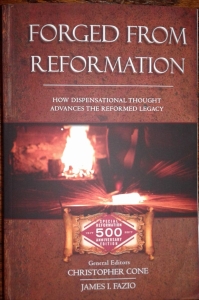 I purchased the volume Forged from Reformation back when it was released last year at the 500th anniversary of the Reformation. This is a work written by dispensational scholars aimed to show how the Reformation is part of the trajectory in theology that led to the dispensationalism of today. I have slowly working through it as I have been able since I got it. Today, I finished the first major section of the work on “Historical Development.” There was a wide variety of essays focused on Luther, and other Reformation figures, in relationship to dispensational thought. Below is a quick and rudimentary summary on each chapter (skipping the introductory chapter):
I purchased the volume Forged from Reformation back when it was released last year at the 500th anniversary of the Reformation. This is a work written by dispensational scholars aimed to show how the Reformation is part of the trajectory in theology that led to the dispensationalism of today. I have slowly working through it as I have been able since I got it. Today, I finished the first major section of the work on “Historical Development.” There was a wide variety of essays focused on Luther, and other Reformation figures, in relationship to dispensational thought. Below is a quick and rudimentary summary on each chapter (skipping the introductory chapter):
Chapter 2: Dispensationalism and the Reformation by Thomas Ice. This chapter is an overall historical summary of key ideas and figures from the Reformation period as they were pertinent to what later developed as Dispensationalism.
Chapter 3: Martin Luther: An Evaluation of the 95 Theses by Patrick Belvill. This was a very interesting introduction to the actual historical document of the 95 theses. It attempted to show proto-dispensational ideas through his interpretive approach. I also found interesting the degree of which repentance is found in his 95 theses. It seems though to be important to note that he seemed to be opposing the Catholic idea of penance in this work, and trying recover a proper notion of repentance without a major reference to the kind of issues we face today in soteriology about the nature of repentance. I think more study could be had on this.
Chapter 4: John Nelson Darby: The Unknown and Well Known Nineteenth Century Irish Reformer by James I. Fazio. This was a very helpful discussion about John Nelson Darby, the one often regarded to be the father of modern dispensationalism. I grew to appreciate his stature as a refomer in Ireland, though centuries after Martin Luther. I recommend it!
Chapter 5: Luther Meets Darby: The Reformation Legacy of Ecclesiastical Independence by Cory M. Marsh. This brings together the previous two chapters to some degree by noting how both Luther & Darby were opposed to the divide between the clergy/laity, and how it produces an independent church rooted in the idea of the priesthood of the believer.
Chapter 6: The Doctrine of Local Church Autonomy: Its Loss, Recovery and Influence on Dispensationalism by Kevin D. Zuber. This chapter is one I found a bit questionable. In it, the author traced the mindset of an independent church from Calvin and other Reformers to the heritage of dispensationalism, which is primarily located today in the independent church movement. As a Baptist and one who has held that Calvin practiced more of a state church in Geneva, this seemed strange and I wasn’t entirely convinced. Further study and comparison with other historical works would need to be done before I would entirely accept his assessment of John Calvin. He may be right, and I could be mistaken. I just was not so sure.
Chapter 7: How Dispensational Thought Corrects Luther’s View of Israel by Brian Moulton and Cory M. Marsh. This attempts to deal with an “elephant” in the room when it comes to dispensationalism and the Reformation — the toxic views held by Luther about Israel. Like other chapters, it is an informative historical analysis. In my view, it rightly points out that the larger basis for Luther’s views of Israel were an inconsistent literal-grammatical-historical hermeneutic and really an ignorance of the historical sense of certain passages, and not any societal or personal background basis.
With having completed this section, I now look forward to in the coming summer months diving into the “solas” section, and especially several essays on the foundational “sola”–“sola scriptura.”
Hi son love you I read this